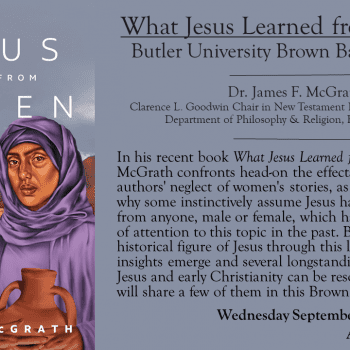It struck me recently that there are so many things that Paul never says, which we might expect him to mention if he thought of Jesus as God. What is the significance of a divine being becoming human? Of a divine being being crucified? Of a divine being returning to heaven after having done these things? Paul talks about Jesus’ obedience, but it doesn’t seem to be connected for him with a divine person being obedient, which raises unique issues, as later Christians who thought of Jesus in these terms realized. He talks about Jesus’ exaltation to heaven, but it is never depicted unambiguously as a return to a place where Jesus had been before. Sometimes silences are important – but it can be very hard to notice what someone never says, if we already have in our minds the assumption that they were thinking in these terms. And yet, if they were thinking in these terms, their silences seem inexplicable.
On a related note, some have understood the reference to Jesus being “born of a woman” (Galatians 4:4) as indicating a virginal conception. But it does no such thing. In the Gospels, Jesus refers to John the Baptist as the greatest among those born of women. It is just an expression that means “human being.” (See also Daniel Gulotta’s post on what Paul knew about Jesus).
Also of interest elsewhere around the blogosphere, Dale Tuggy blogged about whether Jesus (as depicted in the New Testament) had faith in God.
Larry Hurtado has an interesting post about Mark’s Christology, and how to plausibly make sense of its lack of any mention of Jesus’ pre-existence if Paul was already talking about the idea some decades earlier. Of course, one option would be to follow James Crossley and Maurice Casey in dating Mark to the 40s- perhaps this is a good argument in favor of that view?
Andrew Perriman discusses Bauckham’s treatment of Jesus’ sitting on the divine throne, which Perriman rightly points out fails to do justice to the fact that Jesus is exalted and given authority to sit and rule as he does by God, which seems to include Jesus in God’s sovereignty in a manner that explicitly distinguishes him from God’s identity.
Michael Kruger actually highlights what is missing from Paul, when he cites a second century source which makes the kinds of points we would expect Paul to, if he thought of Jesus as God incarnate.
Finally, related to historical study of Jesus, Daniel Gulotta offers a defense of the criterion of embarrassment.












